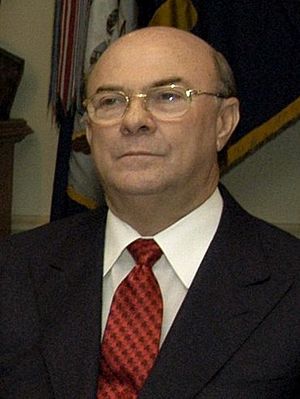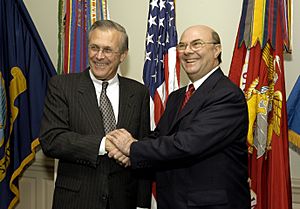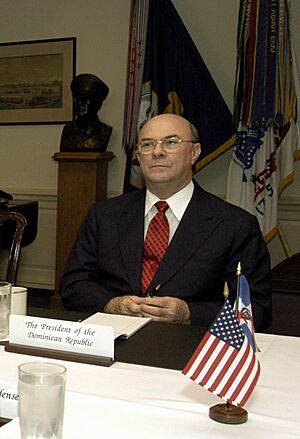Hipólito Mejía facts for kids
Quick facts for kids
Hipólito Mejía
|
|
|---|---|

Hipólito Mejía in 2003
|
|
| 51st President of the Dominican Republic | |
| In office 16 August 2000 – 16 August 2004 |
|
| Vice President | Milagros Ortiz Bosch |
| Preceded by | Leonel Fernández |
| Succeeded by | Leonel Fernández |
| Secretary of Agriculture of the Dominican Republic | |
| In office 16 August 1978 – 16 August 1982 |
|
| President | Antonio Guzmán Jacobo Majluta |
| Preceded by | Pedro Agustín Bretón Taveras |
| Succeeded by | José Rafael Ángeles Suárez |
| Personal details | |
| Born | 22 February 1941 Santiago de los Caballeros, Dominican Republic |
| Political party | Modern Revolutionary Party Dominican Revolutionary Party |
| Spouse |
Rosa Altagracia Gómez Arias
(m. 1964; |
| Children |
|
| Relatives |
|
| Alma mater | North Carolina State University |
| Hometown | Gurabo, Dominican Republic |
Rafael Hipólito Mejía Domínguez (born February 22, 1941) is a politician from the Dominican Republic. He served as the 51st President of the Dominican Republic from 2000 to 2004.
During his time as president, the country faced a major economic crisis. This happened after three large banks in the country went out of business. This led to problems like inflation (when prices for goods go up) and a rise in poverty. As president, Mejía also sent 604 Dominican soldiers to support the war in Iraq.
In 2004, he ran for president again but lost the election to Leonel Fernández. Fernández was the same person he had replaced as president four years earlier.
Contents
Early Life and Career
Hipólito Mejía was born in the city of Santiago de los Caballeros. He grew up in a small community called Gurabo. When he was young, he had long, straight blond hair. This earned him the nickname Cabuyita, which is a type of plant fiber.
He graduated from the Loyola Polytechnic Institute in 1962. Later, he studied at North Carolina State University in the United States. In 1964, he married Rosa Gómez Arias, and they had four children together. One of his daughters, Carolina Mejía de Garrigó, also became a politician.
Before becoming president, Mejía worked in agriculture. At just 24 years old, he was a director at the national Tobacco Institute. In 1978, President Antonio Guzmán Fernández appointed him as the Minister of Agriculture. In this role, he helped pass laws to support farming businesses and improve farming in rural areas.
Path to the Presidency
In 1990, Mejía was chosen as the vice-presidential candidate for the Dominican Revolutionary Party (PRD). He ran alongside the party's leader, José Francisco Peña Gómez.
Ten years later, in 2000, Mejía ran for president himself. He promised to improve healthcare, education, and social programs for the people. In the first round of voting, he won 49.87% of the votes. This was very close to the 50% needed to win without a second round.
His main opponent, Danilo Medina, realized he could not catch up in a second vote. So, Medina decided to drop out of the race. This made Hipólito Mejía the new president. He officially took office on August 16, 2000.
Presidency (2000–2004)
During the first two years of his presidency, Mejía was very popular. He focused on helping small businesses, farmers, and rural communities. He also created the country's first social security system, which helps people save for retirement. His party, the PRD, did very well in the 2002 elections, winning most of the seats in the Senate.
Economic Crisis
A major event during Mejía's term was a severe economic crisis. It was triggered when Baninter, the country's second-largest private bank, collapsed. The government decided to protect the money of the people who used the bank. However, this cost the country a lot of money.
The crisis led to high inflation, meaning money was worth less and prices for everyday items went up. This made life difficult for many people in the Dominican Republic. While his government faced challenges, Mejía himself was never taken to court or linked to the bank's failure. The head of the bank was later found guilty and sent to prison.
Foreign Policy

On the world stage, Mejía's government made the decision to send about 600 Dominican soldiers to the Iraq War. This was part of an international group of forces led by the United States.
By the end of his term, the economic problems were still a major issue. In the 2004 presidential election, Mejía ran for a second term but was defeated by his predecessor, Leonel Fernández.
After leaving office, Mejía ran for president again in the 2012 election but lost to Danilo Medina.
See also
 In Spanish: Hipólito Mejía para niños
In Spanish: Hipólito Mejía para niños
 | Selma Burke |
 | Pauline Powell Burns |
 | Frederick J. Brown |
 | Robert Blackburn |


